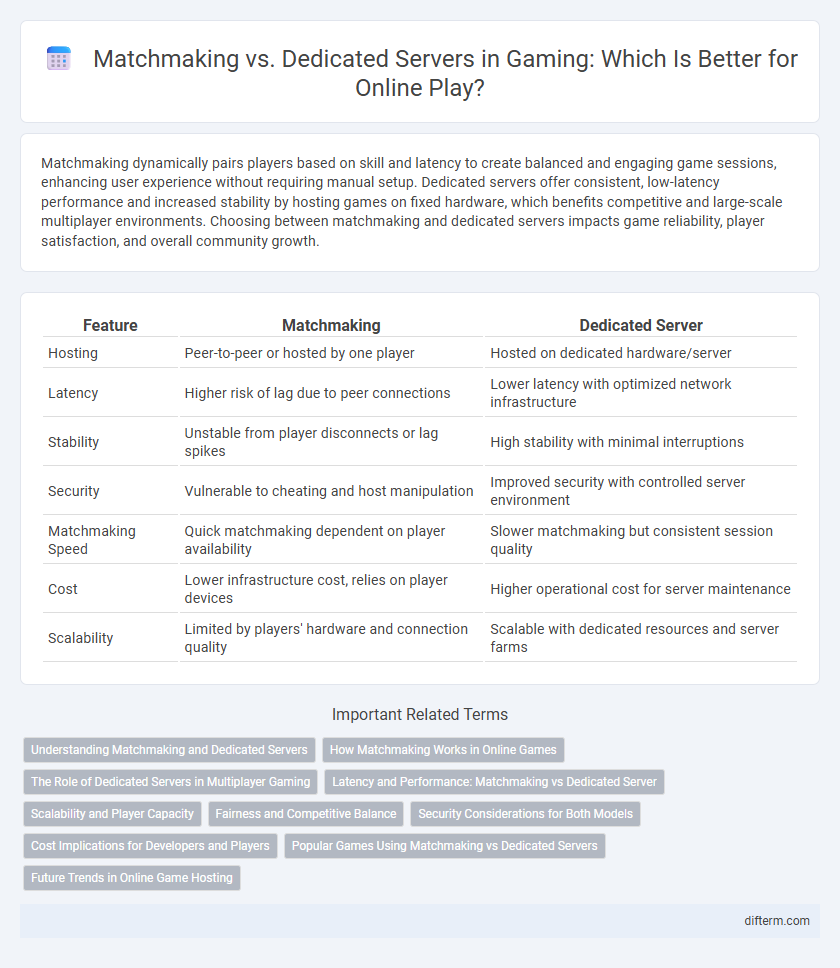Matchmaking dynamically pairs players based on skill and latency to create balanced and engaging game sessions, enhancing user experience without requiring manual setup. Dedicated servers offer consistent, low-latency performance and increased stability by hosting games on fixed hardware, which benefits competitive and large-scale multiplayer environments. Choosing between matchmaking and dedicated servers impacts game reliability, player satisfaction, and overall community growth.
Table of Comparison
| Feature | Matchmaking | Dedicated Server |
|---|---|---|
| Hosting | Peer-to-peer or hosted by one player | Hosted on dedicated hardware/server |
| Latency | Higher risk of lag due to peer connections | Lower latency with optimized network infrastructure |
| Stability | Unstable from player disconnects or lag spikes | High stability with minimal interruptions |
| Security | Vulnerable to cheating and host manipulation | Improved security with controlled server environment |
| Matchmaking Speed | Quick matchmaking dependent on player availability | Slower matchmaking but consistent session quality |
| Cost | Lower infrastructure cost, relies on player devices | Higher operational cost for server maintenance |
| Scalability | Limited by players' hardware and connection quality | Scalable with dedicated resources and server farms |
Understanding Matchmaking and Dedicated Servers
Matchmaking systems automatically connect players based on skill level, region, and latency to ensure balanced and competitive gameplay. Dedicated servers provide a stable, consistently hosted environment with low latency and enhanced performance by running on remote hardware specifically for the game. Understanding the differences helps players and developers choose between dynamic player-driven connections and reliable server infrastructure for optimal gaming experiences.
How Matchmaking Works in Online Games
Matchmaking in online games uses algorithms to pair players based on skill level, latency, and game mode preferences, ensuring balanced and competitive matches. This system dynamically searches for appropriate opponents, reducing wait times and enhancing the player experience without relying on a fixed infrastructure. Unlike dedicated servers, matchmaking leverages peer-to-peer connections or cloud-hosted sessions to create flexible and scalable multiplayer environments.
The Role of Dedicated Servers in Multiplayer Gaming
Dedicated servers provide a stable and consistent environment for multiplayer gaming, ensuring low latency and reduced lag compared to matchmaking-based peer-to-peer connections. By handling all game data centrally, these servers minimize cheating and synchronization issues, enhancing fairness and competitive integrity. Their scalability supports large player counts and complex game worlds, making them essential for modern multiplayer titles.
Latency and Performance: Matchmaking vs Dedicated Server
Dedicated servers consistently offer lower latency and more stable performance by providing a centralized, optimized environment for handling game data, minimizing lag and packet loss. Matchmaking systems, relying on peer-to-peer connections, often experience variable latency due to differing player locations and network conditions, impacting game smoothness. Prioritizing dedicated servers improves responsiveness and overall gameplay experience, essential for competitive gaming scenarios demanding real-time synchronization.
Scalability and Player Capacity
Matchmaking systems dynamically allocate players to available servers, optimizing resource usage but often facing limitations in scalability and maximum player capacity per session. Dedicated servers provide consistent performance with higher scalability, supporting larger player counts and reducing latency for competitive gaming environments. Choosing dedicated servers enhances player experience by maintaining stability and accommodating growing player bases effectively.
Fairness and Competitive Balance
Matchmaking systems prioritize fair player skill matching by dynamically pairing users based on ranking metrics such as ELO or MMR, fostering balanced and competitive gameplay. Dedicated servers provide consistent, low-latency environments that reduce connection disparities, ensuring all competitors experience equal network conditions and minimizing advantages from location-based lag. Combining robust matchmaking algorithms with dedicated server infrastructure enhances fairness and maintains competitive integrity across diverse player bases.
Security Considerations for Both Models
Matchmaking systems often rely on peer-to-peer connections, increasing vulnerability to DDoS attacks and cheating due to lack of centralized control. Dedicated servers provide enhanced security by maintaining full control over game data and player interactions, enabling robust anti-cheat measures and consistent encryption protocols. However, dedicated servers require constant maintenance and monitoring to promptly address emerging threats and ensure a secure gaming environment.
Cost Implications for Developers and Players
Matchmaking systems reduce upfront infrastructure costs for developers by leveraging peer-to-peer connections, but may increase latency and server load unpredictability. Dedicated servers require higher initial investment and ongoing maintenance expenses, yet offer consistent performance and reliability attractive to competitive players. Players often face lower latency and better matchmaking fairness with dedicated servers, while matchmaking systems can lead to cost savings passed down through lower game prices or subscription fees.
Popular Games Using Matchmaking vs Dedicated Servers
Popular games such as Fortnite, Apex Legends, and Call of Duty: Warzone primarily use matchmaking systems to dynamically pair players based on skill and latency, ensuring balanced and competitive gameplay experiences. In contrast, titles like Minecraft, Counter-Strike: Global Offensive, and Battlefield series often rely on dedicated servers to provide stable, low-latency environments with persistent world states and customizable settings for larger communities. The choice between matchmaking and dedicated servers impacts game performance, player retention, and overall engagement, with each approach offering unique advantages tailored to different game genres and player expectations.
Future Trends in Online Game Hosting
Future trends in online game hosting indicate a growing preference for dedicated servers due to their superior performance, lower latency, and enhanced security compared to traditional matchmaking systems. Cloud-based dedicated servers leverage scalable infrastructure, enabling dynamic resource allocation to accommodate fluctuating player counts and ensuring a seamless gaming experience. Integration of AI-driven optimization and real-time analytics further enhances server stability and matchmaking precision, setting new standards for competitive and cooperative online play.
matchmaking vs dedicated server Infographic

 difterm.com
difterm.com